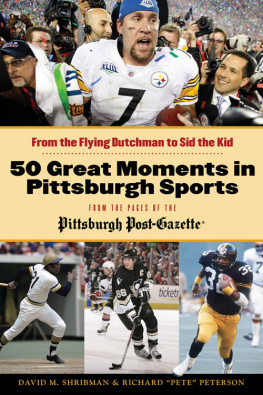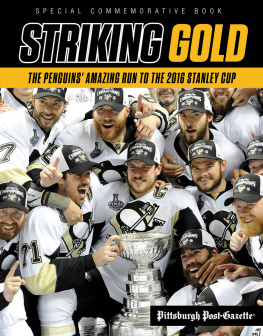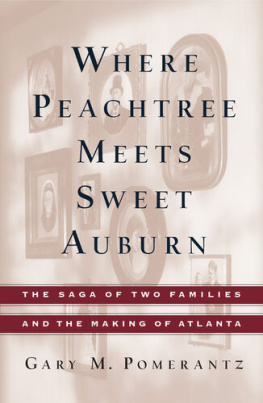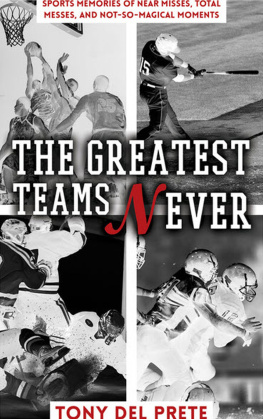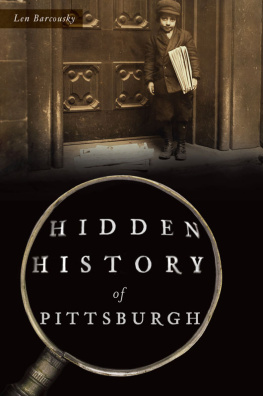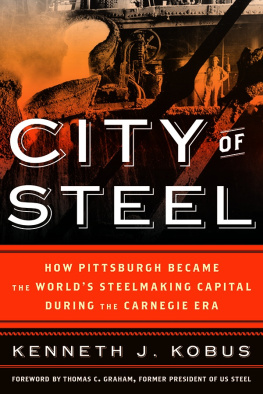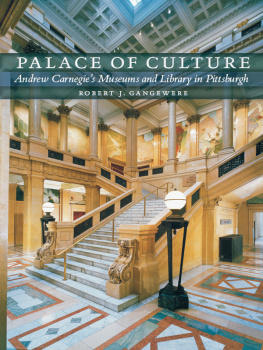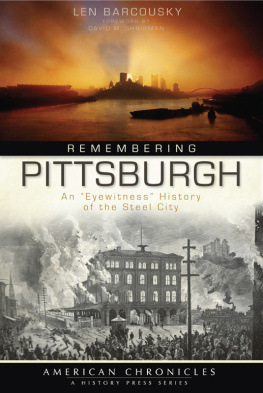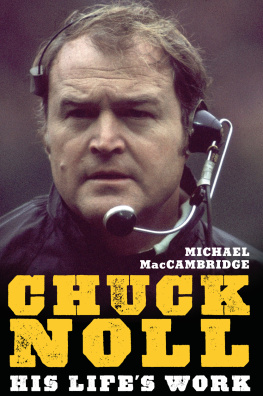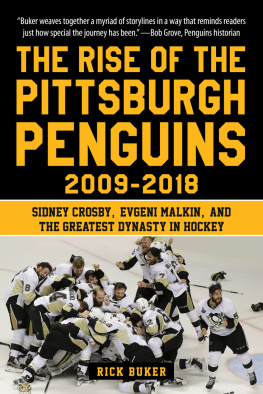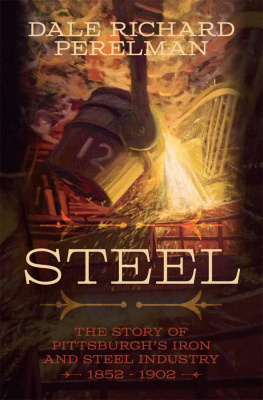preface by David M. Shribman
Executive Editor, Pittsburgh Post-Gazette
Moments, moments. The history of sports is but a collection of moments.
First there are national moments. The time Carlton Fisk, with his hands, his legs, and all the power of his heart, virtually willed a hard-hit ball over the fence in the sixth game of the 1975 World Series at Fenway Park. The time Johnny Unitas drove the Baltimore Colts down the field in an overtime NFL championship game in 1958 that ended when Alan Ameche scored from the 1-yard line and that began pro footballs reign as a great American sport. The time a scraggly group of Americans pulled off a miracle on ice and beat the Soviets in a Cold War confrontation on American territory, in an arena at Lake Placid.
Then there are our personal moments, and we can all list our own. For Pete Peterson, it was playing catch in a South Side alley with his father and going out to Oakland and its most alluring attraction, the old ballyard on Forbes Avenue. For me, it was being taken by my father and grandfather to my first Red Sox game, a no-hitter as it turned out, performed by the graceful Earl Wilson on a beautiful June night four months before the missiles would be discovered in Cuba. And it was taking my wife and daughter, clad in black and gold, to watch Troy Polamalu make the interception that sent our beloved Steelers to the Super Bowl in 2008.
And finally there are our towns memories: those magic evenings swinging Terrible Towels after Super Bowl victories. The stories about Duquesne basketball teams of yore. The cries of c hicken on the hill a nd here we go! and lets go Pitt! , the strains of We Are Family and Renegade . And of perhaps the worst 24 hours in Pittsburgh sports, when Pitt was denied an Orange Bowl appearance and the Steelers were denied a victory over the Raiders with two last-20-second pass receptions in the very same chilly end zone in December 2009.
Sporting events are not the most important things we do. We are born, are educated, get married, have kids, and then die. All those things are more important than any game. Our country elects presidents, goes to war, suffers from economic downturns, enjoys boom periods, endures crises. No comparison. But maybe because the games we watch are so less importantmaybe because they are diversions from the important thingsthat we keep them with us, year after year, through boom and bust, war and peace, personal triumphs, family tragedies. They are our companions.
No one alive in Pittsburgh on December 23, 1972 (and many thousands born long after), walks this Earth without a memory of what Franco Harris did against a stunned Oakland Raiders team at Three Rivers Stadium. We go through our days remembering where we were when Forbes Field closed, when Mario Lemieux retired, when Roberto Clemente died. We shared the joy of Carnegie Tech when it beat Notre Dame and of Santonio Holmes when his feet caught the corner of a Super Bowl end zone, and we shared the heartbreak of Billy Conn in the 13 th round or of the Penguins in Game 6 of the 2008 Stanley Cup Final.
Here in Pittsburgh we have had our moments, many scores of them, more than our share. Carnegie Tech was once a great football power, and so once long ago was Duquesne, and in more recent years so was Pitt. College basketball has thrived here, both the male and female variety, the Civic Arena for some fleeting moments seeming like our local Palestra, and we have had a few strong cups of coffee with pro basketball. Hockey is a language and religion all its own, spoken and practiced here. And if you are younger than 19 years old you will have to take my word for this, but baseball has thrived in our neighborhood for more than a century, and we have the pennants to prove it.
So when Pete Peterson, professor and professed sports nut, and I came up with the idea of collecting the greatest sports stories in Post-Gazette history, we had a challenge on our hands. He grew up here but didnt live here anymore, and I grew up elsewhere but live here now. Together we covered a lot of territory, but not all. We enlisted the help of the late Phil Musick, longtime sportsman and a journalist possessed of a great memory, to fill in some of the gaps, and then the two of us, Pete and I, put together a couple of draft listsjust like the pros do, though we had the advantage of knowing how things turned out. And with the indispensable help of Angelika Kane and Taryn Luna, two Post-Gazette staff members who helped us assemble this book, we started reading the original stories about the events for which we had only heard stories.
You wont find everything in here. The second Pens Stanley Cup, for example, is missing, and not because we didnt have great respect for Larry Murphy and Tom Barrasso, Bob Errey and Bryan Trottier. A labor dispute kept the Post-Gazette from publishing, so your best bet is to go to YouTube and hear Mike Lange cry, Lord Stanley, Lord Stanley, get me the brandy. Many of your favorites probably have been omitted as well. We have a file of things that didnt make it, including a 1921 story about a Pirates win streak over the Phillies that captures both the tone of the time and the sportswriting of the time: It was the fourth consecutive success for the Buccos and the third straight victory over the Quakers, the first game of the set having been postponed by rain. No one writes stories like that anymore, but then again the Bucs dont beat the Phils three in a row anymore either.
You will find a lot of your memories between these covers, and a lot of stories that will re-create your parents memories. We have title fights and twin bowl victories performed by Pitt and Duquesne (Rose and Orange, 1937). We have Calder Cups and Arnold Palmer at the Masters. We have Beaver Falls defeating Aliquippa in a WPIAL basketball championship and a Triangles title, Don Hennons 45 points in a double-overtime game against Duke , a Pitt Olympic gold medal, a nd Tony Dorsett breaking an all-time rushing record and much, much more.
But in unearthing all of these storiesin finding some of the truly golden needles hiding in the Post-Gazette s haystack, itself nearly two and a quarter centuries in the makingPete and I made a discovery richer than any one of the hundred we assembled in this volume. We found that sports, which we thought was the ultimate shared experience, was above all a personal experience. It was the games we saw, the stories we had only heard about, the moments we remembered, that mattered. There was, of course, the roar of the crowd in almost every one of these pages you are about to turn. But it is our conviction that the strongest sound you will hear is the murmur of your own heart and the stirrings of your own spirit. Sport does that to us, and for us.
Pirates Are World Champions, 8 to 0; Babe Adams Hero of Pittsburgh Fandom
Tigers Annihilated by Invincible Band Under the Picaroon Banner
Fred Clarkes Marauders Carry Off Hide of Jungle King in Final Invasion of His Lair
Wild Bill Donovan Lives Up to His Name
October 17, 1909
By Edward F. Balinger
The Pittsburgh Gazette Times
DETROITOctober 15High over a slain Tiger tonight, the Pirate pennant of victory heralds that Pittsburgh has won the most stubbornly contested series of games for the worlds baseball championship ever played.
Babe Adams, the wonder Fred Clarke brought from the Blue Grass realm, again took the measure of Hughie Jennings pride, and its colors trailed in the dust of defeat by a score of 8 to 0.
From the moment the first of Clarkes warriors stepped to the plate the slaughter began.
There was no let-up.
Teams Fought for Every Point
The National League players mean to keep the championship, and fought every inch of the way until the last man was out in the ninth. Even after the lead was so great that victory was practically assured, the Pittsburghers kept up the killing pace.
Next page
